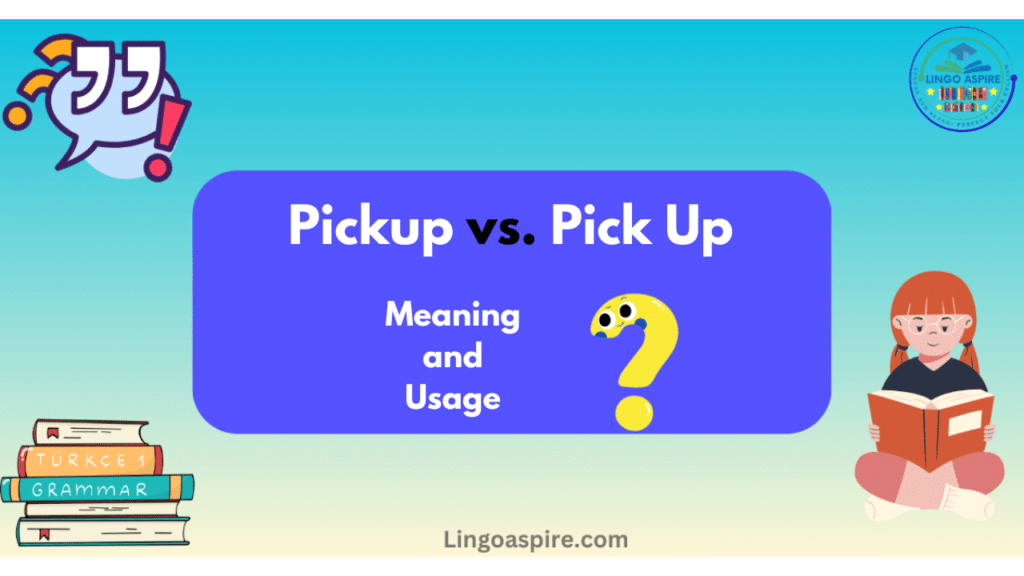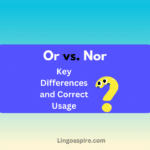English can be tricky, especially when words look similar but have different meanings. The difference between pickup vs. pick up confuses many people because they sound the same but function differently in sentences.
One reason for the confusion is how the English language evolves. Sometimes, words merge into one, while other times, they stay separate. The shift in spelling depends on usage, grammar, and meaning. Another reason is that dictionaries and style guides have changed their recommendations, which means that what was once correct may no longer be widely accepted.
Writers often struggle to choose the right form in emails, essays, and professional documents. Understanding the correct usage helps you write clearly and avoid common grammar mistakes.
The Meaning of “Pickup” (One Word, Noun & Adjective)
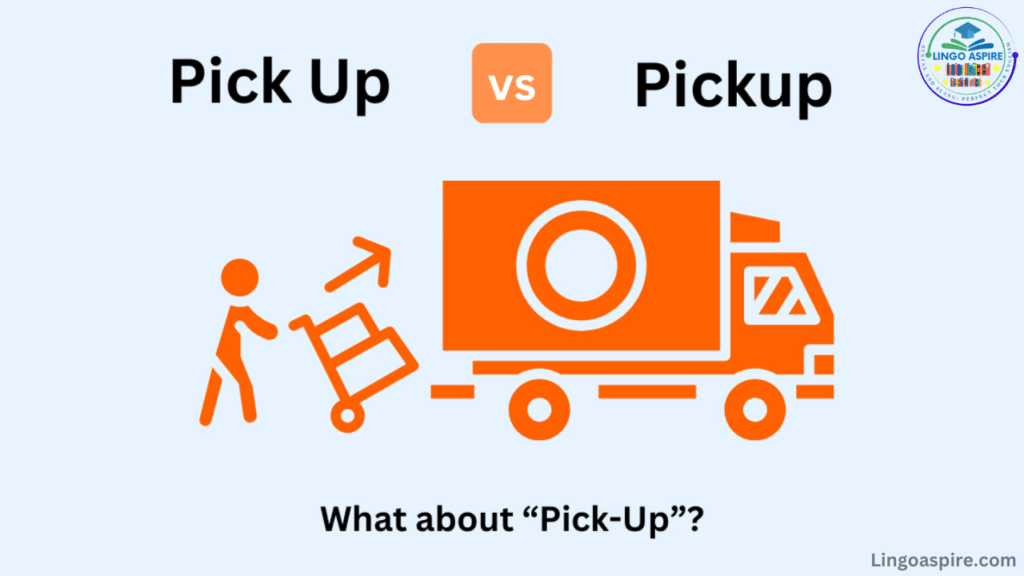
The word “pickup” is most commonly used as a noun or an adjective. When written as a single word, it refers to a specific object, action, or quality. It does not function as a verb.
Examples of “Pickup” as a Noun:
- “The pickup location is at the front entrance.”
- “She scheduled a pickup for her package.”
- “The team’s performance saw a noticeable pickup after halftime.”
Common Uses of “Pickup” as a Noun:
| Usage | Meaning | Example Sentence |
|---|---|---|
| Vehicle | A small truck with an open back | “He bought a new pickup truck.” |
| Improvement | An increase in speed, energy, or quality | “There’s been a pickup in sales.” |
| Collection | The act of collecting something | “The laundry pickup is scheduled for noon.” |
As an adjective, “pickup” describes a noun. It tells us more about the noun that follows it.
Examples of “Pickup” as an Adjective:
- “He bought a pickup truck.”
- “We need a pickup order from the restaurant.”
When Should You Use “Pickup”?
Use “pickup” when referring to a thing (a noun) or when describing something related to collection, improvement, or vehicles (an adjective). It is never used as a verb.
The Meaning of “Pick Up” (Two Words, Verb Phrase)
The phrase “pick up” is a phrasal verb and always consists of two words. It is used when referring to an action. Since it includes a verb (“pick”), it means to lift, collect, improve, or learn something.
Examples of “Pick Up” as a Verb:
- “Can you pick up the kids from school?”
- “She picked up Spanish while traveling.”
- “Sales will pick up next month.”
Common Uses of “Pick Up”:
| Usage | Meaning | Example Sentence |
|---|---|---|
| To collect | Retrieve or gather something | “I’ll pick up my order at 5 PM.” |
| To learn | Acquire a skill or knowledge | “He picked up a few French words.” |
| To improve | Get better or increase | “The weather is starting to pick up.” |
| To lift | Physically raise something | “She picked up the book from the floor.” |
Common Mistakes with “Pickup vs. Pick Up”
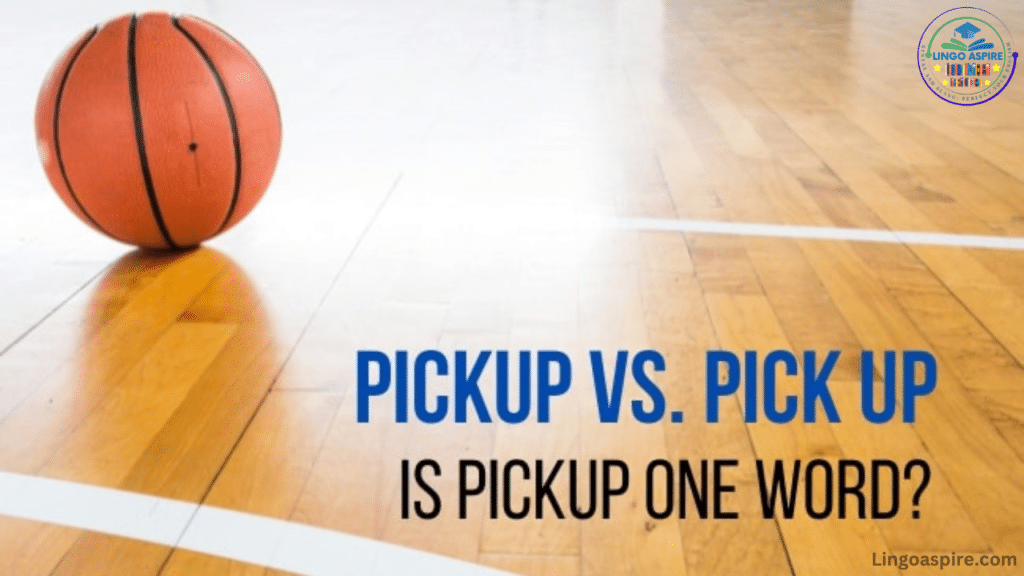
English learners and even native speakers often misuse pickup, pick up, and pick-up. These errors usually stem from not recognizing their distinct grammatical roles. Below are some of the most frequent mistakes and how to avoid them.
1. Using “Pickup” When “Pick Up” Is Needed
One of the most common mistakes is using “pickup” as a verb. Since “pickup” is a noun or adjective, it cannot replace “pick up,” which is a verb.
Incorrect:
✔️ “Can you pickup my brother from school?” ❌ (Wrong)
✔️ “I need to pickup my order at the restaurant.” ❌ (Wrong)
Correct:
✔️ “Can you pick up my brother from school?” ✅
✔️ “I need to pick up my order at the restaurant.” ✅
2. Using “Pick Up” When “Pickup” Is Needed
Another mistake is writing “pick up” as two words when referring to a noun (a thing) or an adjective (describing something).
Incorrect:
✔️ “He bought a new pick up truck.” ❌ (Wrong)
✔️ “They played a quick pick up game.” ❌ (Wrong)
Correct:
✔️ “He bought a new pickup truck.” ✅ (Noun)
✔️ “They played a quick pickup game.” ✅ (Adjective)
3. Forgetting the Context and Meaning
The same phrase can have different meanings based on the context, which sometimes confuses writers.
- “Pick up” can mean to collect, lift, or improve.
- “Pickup” refers to a vehicle, a game, or an increase in speed or performance.
Example:
✔️ “Can you pick up some milk on your way home?” ✅ (Correct verb usage)
✔️ “His business saw a pickup in sales last month.” ✅ (Correct noun usage)
Key Differences: Pickup vs. Pick Up
The easiest way to remember the difference is:
- “Pickup” (one word) is a noun or adjective.
- “Pick up” (two words) is a verb phrase.
| Word | Part of Speech | Meaning | Example Sentence |
|---|---|---|---|
| Pickup | Noun/Adjective | Object or action | “He owns a pickup truck.” |
| Pick up | Verb Phrase | Action of lifting, collecting, or improving | “She will pick up the package.” |
Origins and History of Pickup vs. Pick Up
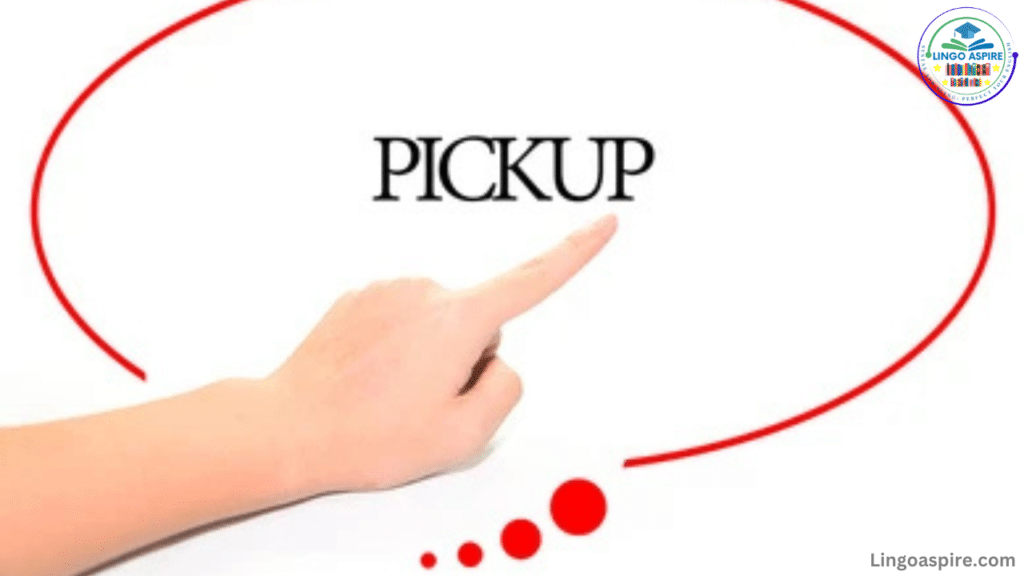
The phrase “pick up” has existed since the 1500s, meaning to lift or gather something. Over time, it gained additional meanings like “improve” or “collect someone”. The single-word “pickup” emerged in the 1900s, especially in American English, to describe a vehicle or an act of collection.
Today, “pickup” is the preferred spelling for nouns, while “pick up” remains the correct form for verbs.
Examples in Context: “Pickup vs. Pick Up”
Understanding how pickup, pick up, and pick-up function in sentences will help you use them correctly. Below are real-world examples to illustrate their meanings.
1. “Pickup” as a Noun (Refers to a thing)
- “He bought a new pickup to transport goods.” (Refers to a pickup truck)
- “The restaurant offers pickup orders for customers in a hurry.” (Refers to the act of collecting something)
- “There was a sudden pickup in sales after the holiday promotion.” (Refers to an increase in activity)
2. “Pickup” as an Adjective (Describes something)
- “They played a pickup basketball game in the park.” (Describes a casual, unorganized game)
- “The courier service offers pickup locations across the city.” (Describes designated collection points)
3. “Pick Up” as a Verb (An action)
- “I will pick up my dry cleaning after work.” (Means to collect something)
- “She managed to pick up some French while living in Paris.” (Means to learn something informally)
- “Can you pick up the phone? It’s been ringing for a while.” (Means to answer a call)
- “He needs to pick up the pace if he wants to win the race.” (Means to increase speed)
Synonyms & Alternative Phrases
For “pickup” (noun):
- Collection
- Retrieval
- Improvement
- Boost
- Truck
For “pick up” (verb):
- Lift
- Grab
- Gather
- Collect
- Acquire
Tricks to Avoid Misusing These Words
One trick is to replace “pick up” with “collect” in a sentence. If it still makes sense, use “pick up”. If not, you likely need “pickup”.
Example:
- “I will pick up my order.” (Correct because “I will collect my order” works.)
- “The pickup time is 5 PM.” (Correct because “The collect time is 5 PM” sounds wrong.)
FAQs About Pickup vs. Pick Up
1. When should I use “pickup” instead of “pick up”?
Use “pickup” when referring to a noun (e.g., a vehicle or an increase in something) or as an adjective (e.g., a spontaneous game or event). Use “pick up” when describing an action (verb), such as lifting, collecting, or improving something.
Example:
- Noun: “He bought a new pickup truck.”
- Adjective: “They played a quick pickup game of soccer.”
- Verb: “Can you pick up some groceries on your way home?”
2. Is “pick-up” with a hyphen still correct?
The hyphenated form “pick-up” was commonly used in the past, but modern English generally prefers “pickup” (noun/adjective) or “pick up” (verb). However, you may still see “pick-up” in older texts or in specific style guides that haven’t updated their rules.
3. Can “pick up” be used in different ways?
Yes! “Pick up” is a phrasal verb with multiple meanings depending on context:
- To lift something: “He bent down to pick up the book.”
- To collect someone/something: “I’ll pick up my friend from the airport.”
- To improve: “Sales started to pick up after the holiday season.”
- To learn something informally: “She quickly picked up some French while in Paris.”
Conclusion
Understanding the difference between pickup Vs. pick up helps you avoid mistakes in writing. If you need a noun, use “pickup”. If you’re describing an action, use “pick up”. The hyphenated form “pick-up” is outdated. Mastering these rules will improve your grammar and writing skills.
Sources
The Merriam-Webster Dictionary is a widely recognized authority on English language usage. It provides definitions and examples of “pickup”, “pick up”, and historical changes in their usage. According to Merriam-Webster, “pickup” is a noun or adjective, while “pick up” is a verb phrase. It also notes that “pick-up” was more common in older English but has mostly been replaced by “pickup” in modern writing. The dictionary also includes pronunciation guides, word origin details, and related phrases.
The Cambridge Dictionary offers in-depth explanations of “pickup” and “pick up”, along with real-life usage examples. It highlights common mistakes learners make and provides detailed definitions for both formal and informal contexts. For instance, it explains how “pickup” can refer to an improvement in business performance or a small truck, whereas “pick up” functions as a verb for collecting objects, increasing speed, or improving skills. Cambridge also provides pronunciation differences between British and American English.
The Grammarly Blog is a trusted resource for grammar and writing rules. It provides a comprehensive breakdown of the differences between “pickup”, “pick up”, and “pick-up”, along with writing tips to avoid common mistakes. The article explains how “pickup” is often used incorrectly as a verb and offers tricks to remember the correct usage. Grammarly also discusses the evolving nature of the English language and how some spellings change over time.

